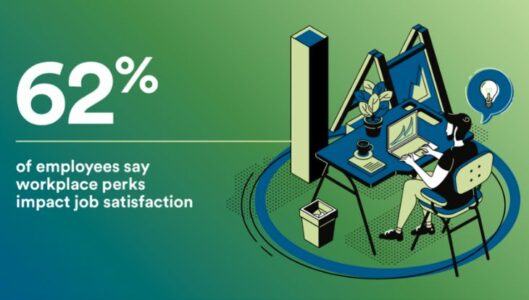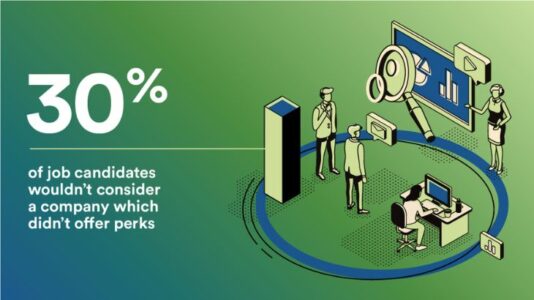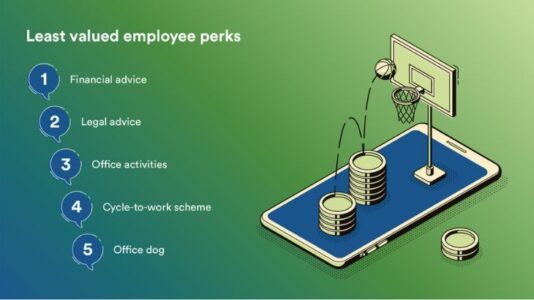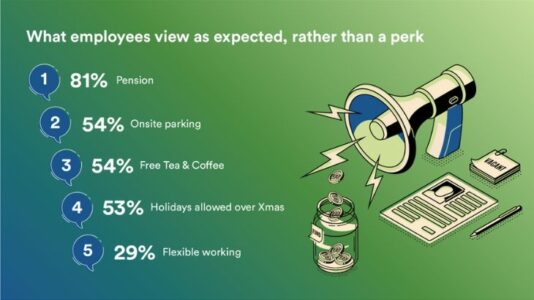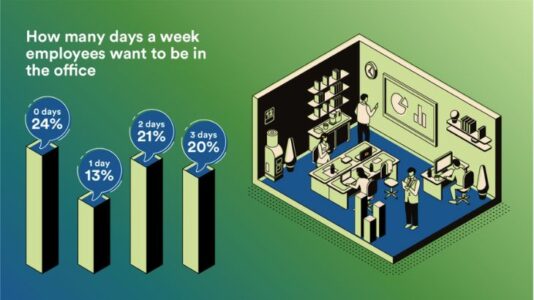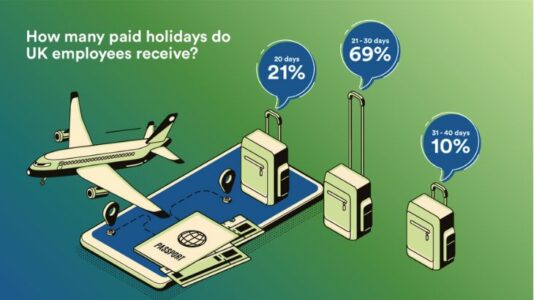Even before the COVID pandemic changed the way we worked, perks and benefits were a major workplace want. And now after over two years of remote work, the state of play has changed even more.
Today, businesses are expected to supply beneficial perks that can improve employees’ time at work and their lives outside of the office. By offering a slew of extras like this, businesses can reap the benefits of a happy, motivated, and cared-for employee base.
But the opposite is also true. Businesses that aren’t prepared to play ball when it comes to benefits are paying the price for falling behind: departing employees, a disgruntled workforce, and costly hires to make up the numbers.
Clearly, workplace perks are more important than ever. But which are the ones that employees value the most, and how have the events of the previous two years affected the conversations surrounding benefits? That’s what we sought to uncover in our latest survey. Read on for our results and insights below…
Want to see what SEFE Marketing & Trading offer to all our employees? Head over to our Employee Benefits & Perks page for more details on things like our Pension Scheme and Employee Assistance Programme.
About the study
So how did we find out which workplace perks matter most to employees? To create our study, we surveyed a number of UK professionals, exploring their attitudes towards perks and benefits from a number of different angles.
By looking at their most-valued to their least-valued perks, their attitudes to ‘hard’ and ‘soft’ perks, and how demands for different benefits have changed during the pandemic, our results provide an in-depth view into just how important a role perks are now playing in the modern workplace.
How important are perks in the current employer landscape?
The fact that 62% say workplace perks directly impact job satisfaction shouldn’t be too surprising in the current landscape. In a remote-heavy work environment, the importance of perks has never been clearer.
The right perks can have a massive impact on job satisfaction, reducing stress and boosting morale. These positives can also lead to an increase in tangible business benefits amongst the workforce, such as increased loyalty and reduced turnover.
Likewise, the reduction in turnover that strong perks afford makes them a whole lot more cost-effective in the long term. Hiring a new employee can put a huge dent in the wallet – around £3,000 in fact. If employees are leaving in droves because of a lack of perks, then businesses should expect to feel the financial sting of trying to make up the manpower in their absence.
It should also be noted that perks were more important to job satisfaction for full-time employees (68%) than part-time employees (52%) – could this be due to comparatively less company loyalty when it comes to the latter?
As if the importance of workplace perks wasn’t clear enough, the above figure certainly puts things in a starker light. Even if the price was right and the work was fulfilling, 30% of the professionals we surveyed said they wouldn’t even bother considering working for a company that was free of perks and benefits.
The message here is obvious: employers could be missing out on some seriously valuable candidates by not having a benefits and perks programme in place. Clearly, job seekers have more of a say than ever in what they want from a company.
The power is in their hands in ways we’ve never seen before. It seems that the pandemic has resulted in a spike in demands and expectations from candidates – and they’re more than happy to look elsewhere should they feel a benefits package be insufficient.
If you’re a business leader, make sure you’re casting your employment net as far as possible by offering valuable, beneficial perks to sweeten the deal.
What are the most and least valued perks to employees?
When it came to the most valued perks that employees value, it’s no surprise that bonuses take the top spot. Obviously, everyone would like a little extra for their hard work, but flexible working isn’t far behind. The pandemic has underscored the importance of maintaining a strong work/life balance, and flexible working has been an absolute game-changer for many in this regard.
Likewise, increased attention on public health caused by the pandemic perhaps shows why private healthcare was also valued so highly in our study. COVID has affected the health and wellbeing of us all and shown just how quickly things can change for us health-wise. Benefit packages that include provisions to take care of employees’ physical and mental health are clearly something the UK professionals we surveyed value.
And compared to some of the least valued perks (financial and legal advice, for instance), it seems that free tea and coffee, as well as employee discounts, still hold sway for some of our surveyed professionals.
Businesses must take time to review their perks, ensuring they’re competitive and in line with what their employees want so they reflect the broader market outlook. Given that the “Great Resignation” (a phenomenon that describes record numbers of people leaving their jobs after the pandemic ends) has been bandied about lately, businesses have to do their utmost to ensure they can retain their key players and most valued staff long after the pandemic.
Two other results also stood out:
– 53% of employees would accept a higher salary with no perks, whereas 47% would accept a lower salary with good perks
– 59% of employees say COVID-19 has affected their workplace perks
It seems that, generally, employees are split on the whole salary vs. perks issue, and we think it would be interesting to see how these numbers would differ had the pandemic not taken place. Would more people have accepted the high salary/no perks package if they hadn’t experienced the colossal changes caused by the onset of the pandemic?
The second result above is also interesting, albeit somewhat unsurprising. With offices emptying, legacy perks such as ping pong, pool tables and other activities within the office were bound to be affected.
But again, this only further emphasises the importance of identifying your employee base and what matters to them. Once you understand more of what they need, your business can put together a benefits package that’s better tailored to their needs.
What constitutes a ‘perk’ according to employees?
The above results are very telling. Pensions, onsite parking, free tea and coffee, and Christmas holidays are unsurprisingly an expectation for many. But two years ago, pre-pandemic, we don’t think flexible working would’ve made an appearance here, or at least not with such a high number.
But the goalposts have moved. Employees expect some degree of flexible work from their employer; those who fail to offer it may see that candidates aren’t exactly flocking to any upcoming job openings they send out.
Like we said earlier, candidates will vote with their feet should a business provide insufficient benefits. Hybrid and flexible working have come on leaps and bounds in ways we’d have never expected. For many, there’s simply no going back to the way things were. And businesses need to be aware of that to maintain an advantage in the current recruitment market.
Flexibility and remote work: The current outlook
Once again, the results above show that flexible and hybrid working are here to stay. What stands out, specifically, is that UK professionals are nearly split on a fully remote approach or a couple of days in the office. Only 12% wanted a full return to the office, showing that the tides have well and truly changed – at least for the time being.
Nevertheless, flexibility will be important for ensuring access to talent. Employers should be mindful of accommodating a range of employee lifestyles and personal circumstances. By doing so, businesses will be able to ensure the widest and most comprehensive talent pool possible.
How many paid holidays do UK employees receive?
Unsurprisingly, the highest number of paid holidays received the lowest share of the vote, with the 21-30 amount netting the highest numbers. With that said, a holiday package above 30 days is sure to give organisations who can sustain it a strong competitive edge over others.
After a tough two years that has seen employees make some real sacrifices – and put in plenty of hard work in less-than-ideal circumstances – could a greater number of paid holidays as a perk become more commonplace? Time will tell, of course.
To find out more about careers at SEFE Marketing & Trading please visit our homepage.
The views, opinions and positions expressed within this article are those of our third-party content providers alone and do not represent those of SEFE Marketing & Trading. The accuracy, completeness and validity of any statements made within this article are not guaranteed. SEFE Marketing & Trading accepts no liability for any errors, omissions or representations.

